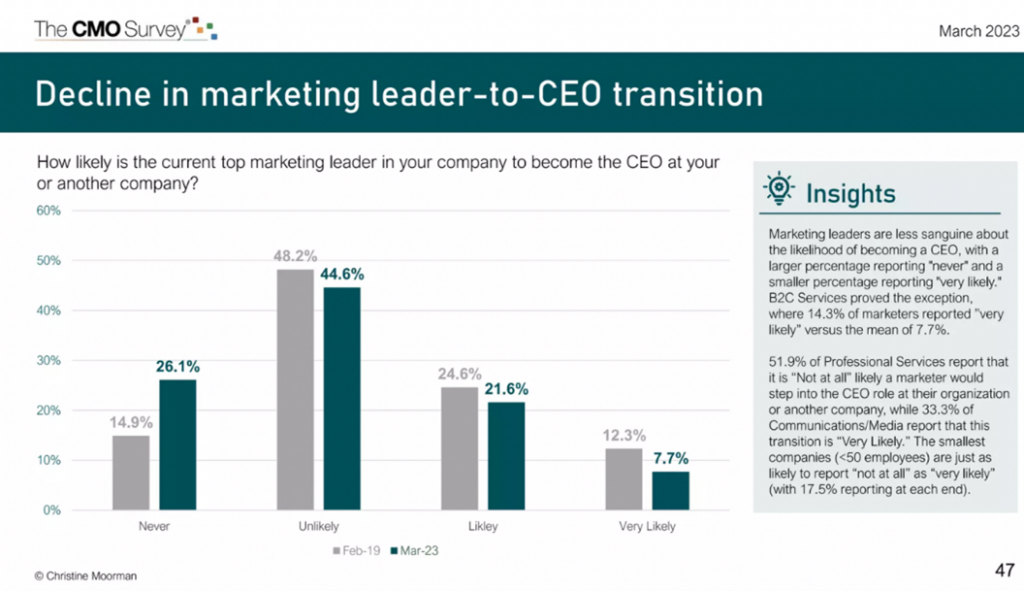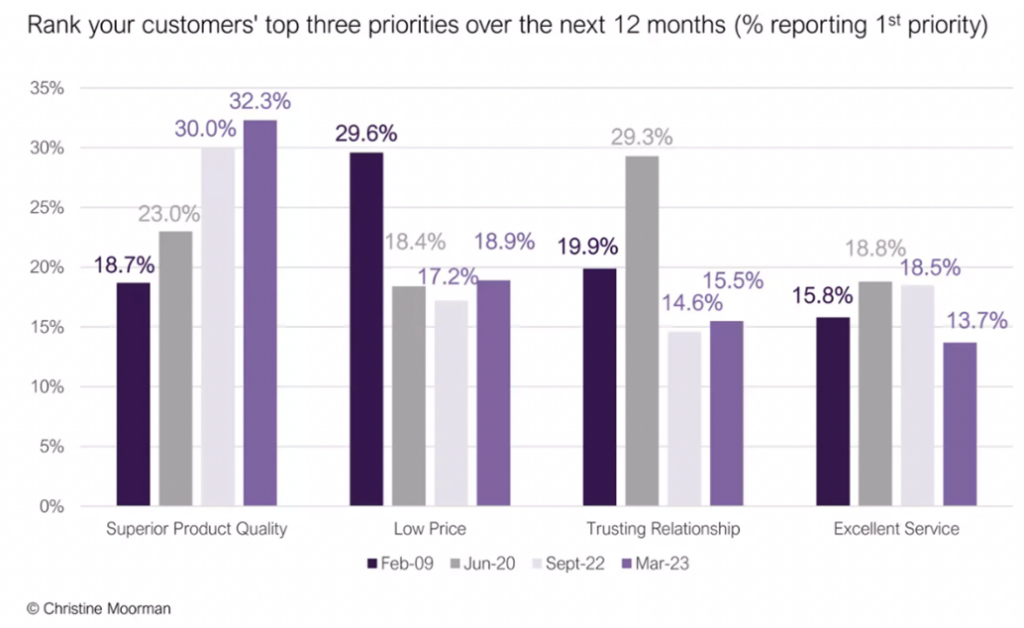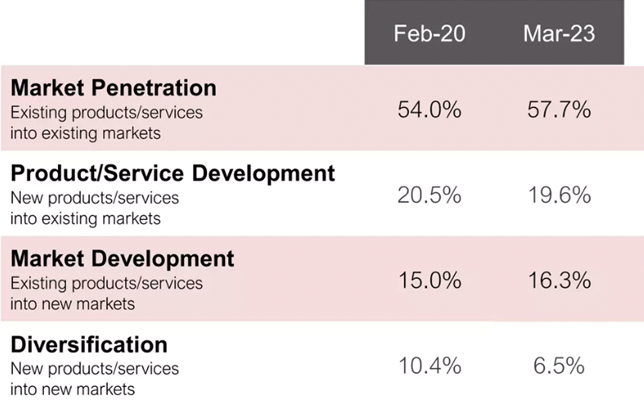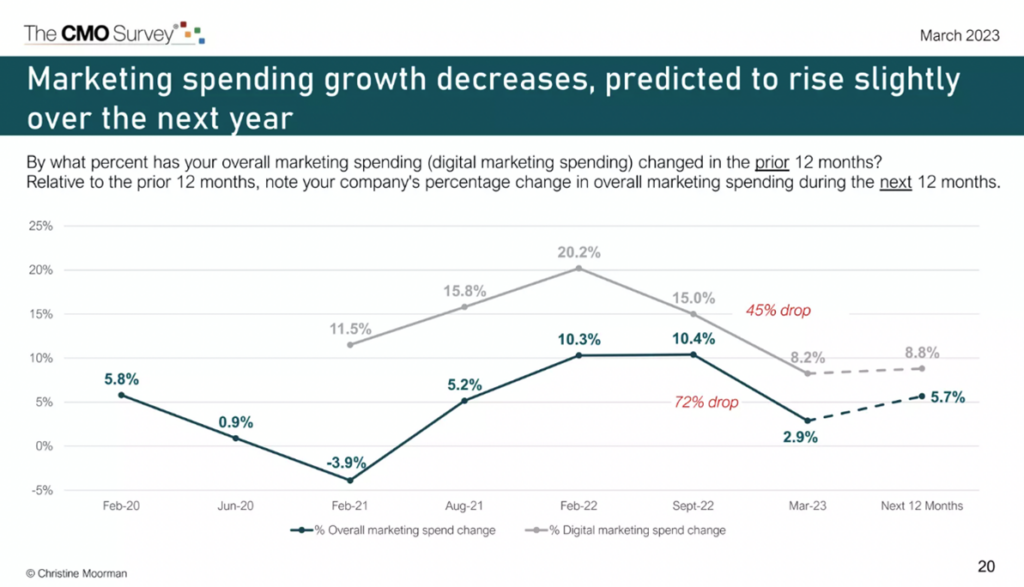By Jal Sonpal | Manager – Public Relations, AMA Toronto
In today’s rapidly evolving business landscape, marketing leaders face a myriad of challenges. To navigate these hurdles successfully, it’s imperative to understand the pulse of the market, track marketing excellence, and continuously enhance the value of marketing within organizations. One invaluable resource that sheds light on these critical aspects is the annual CMO Survey.
Conducted by Christine Moorman at Duke University’s Fuqua School of Business in partnership with the American Marketing Association and Deloitte, the CMO Survey serves as a compass, capturing the opinions and experiences of marketing leaders to predict the future of markets and drive positive change.
Recently published, the 30th edition of the CMO Survey provides a timely snapshot of the strategies employed by marketing departments amidst today’s economic uncertainty and inflationary pressures. Drawing insights from marketing leaders across various industries, including tech, consumer packaged goods, retail, and banking, this survey encompasses a wide spectrum of perspectives. From small-scale startups to multinational giants, the participating companies represent a diverse range of sizes and revenues.
So, let’s explore some of the key take-aways from the latest CMO Survey.
1. Marketing Leaders are Trusted Advisors at the C-Suite Level
The 2022 CMO Survey had revealed an impressive statistic: over 63% of marketing leaders are invited to participate in board meetings, earning the trust and recognition of the C-suite.
Notably, in 2023, specific industries like CPG and banking/finance highly value marketing leaders, with over 50% of companies considering them as potential candidates for the CEO position. Furthermore, even companies with over 50% of their sales occurring online recognize the potential of their CMOs to assume the role of CEO.
However, in the same year, the overall likelihood of marketing leaders transitioning to the role of CEO stands at 29% a significantly lower number compared to 37% in 2019. This trend seems to be largely influenced by the effects of the pandemic, as well as the increased need for the C-Suite to seek guidance from strategic thinkers with more expertise in economics and finance.

2. Quality Over Price
In the face of evolving customer priorities, CMOs are driving change by aligning marketing strategies with shifting demands. The survey highlights a key aspect of consumer behaviour as superior product quality remains a top customer priority, with 32.3% of marketers recognizing its significance. In contrast to this, low prices were again seen to be less of a priority for customers in 2023, with 18.9% of CMOs ranking it as secondary.

3. Expanding Marketing Channels
Embracing the challenges posed by the pandemic, marketers have deftly adjusted their marketing channels. The survey reveals a notable increase in the utilization of various channels, with face-to-face interactions making a remarkable comeback. Social media has also become a powerful tool for effective product and service promotion. By adopting an omni-channel approach, marketers successfully reach wider audiences, engage customers across multiple touchpoints, and foster meaningful connections that drive business growth.
4. Opportunities for Brand Building
Despite budget constraints, marketers are finding innovative ways to build brand equity. While investments in brand building have seen a slight decrease, marketers are leveraging cost-effective tactics, digital capabilities, and customer-centric experiences to maximize impact. Through these strategies, marketers continue to cultivate strong brand identities and effectively engage target audiences.
5. Strategic Scope of Improvement for Marketers
The survey showcases the expanded role of marketing in critical strategic areas, such as analytics, revenue growth, innovation, and market entry strategies. Marketers recognize the need to leverage data more effectively and build a compelling case for growth strategy, indicating a drive for continuous improvement and excellence.
6. Market Focus
The Ansoff Matrix comparison highlights the shift in marketing spends towards market penetration and development rather than solely focusing on new product development and diversification. This strategic shift enables marketers to seize opportunities in existing markets and drive sustainable growth.

7. Optimizing Marketing Performance
In the face of inflationary pressures, marketers are proactively reassessing their spending to maximize outcomes. Approximately 52% of marketers have adjusted their marketing spend due to inflation, showcasing their strategic approach to cost management. By making informed allocations and optimizing resources, marketers effectively adapt to the changing economic landscape while delivering impactful results.
8. Future Outlook
Good news. Despite cautious spending measures taken by the C-Suite due to economic uncertainty, there is a positive trend on the horizon. While marketing spend growth has decreased to 2.9%, forecasts predict a substantial increase to 5.7% in the upcoming year. This demonstrates the resilience and confidence in marketing's ability to drive business growth.

9. Digital Marketing Dominates
Digital marketing dominates the landscape, with 53.8% of all marketing spends being concentrated in this realm. Notably, Education (75%), Technology (66%), and Healthcare (65%) are leading the charge in digital spending. Conversely, the banking/finance/insurance sectors allocate close to 61% of their marketing budgets to non-digital channels.
The CMO Survey underscores marketers’ resilience and adaptability in navigating economic uncertainty. By aligning with customer priorities, expanding marketing channels, optimizing brand-building efforts, and embracing strategic agility, marketers are well-equipped to thrive in the ever-evolving business landscape. Through innovation and a steadfast commitment to a customer-centric approach, marketers turn challenges into opportunities, forging a path towards long-term success.
The CMO Survey is Part of Marketing Leadership Week
This year, the CMO survey features prominently in AMA Toronto’s inaugural Marketing Leadership Week.
For the last 13 years, AMA Toronto has been tracking and interpreting the annual CMO Survey to explore and explain the findings to its local community. Each spring, the chapter assembles a panel of prominent Canadian CMOs to discuss the data and the emerging marketing landscape.
AMA Toronto presents the 13th annual CMO Panel Breakfast, "The CMO versus the Robots" on June 8th
Join us for a high-level discussion on AI and marketplace trends identified in the CMO Survey. The event featuring speakers from TikTok, AIR MILES, Sony Pictures Entertainment, BMO, and Deloitte on Thursday, June 8th.
Sponsored by HeadStart Copywriting, CISION, and Empathy Inc., with support from presenting sponsor TikTok.
For more information about Marketing Leadership Week:

Jal Sonpal
Manager – Public Relations, AMA Toronto
Jal is a marketing strategist with a decade of work experience under his belt, primarily in sports. He specializes in partnerships, brand management and marketing communications and volunteers with American Marketing Association – Toronto.



